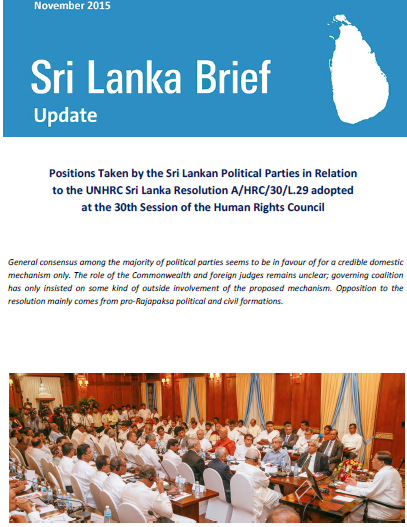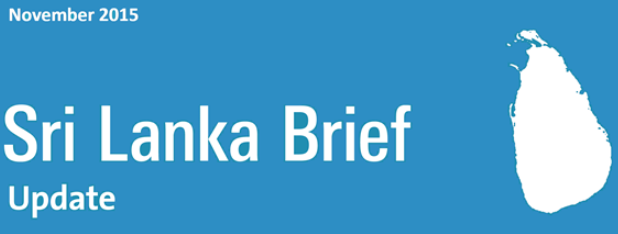(Sri Lanka Brief)
Read the full report as a PDF here:Political Party positions re UNHRC resolution on Sri Lanka
Sri Lanka resolution A/HRC/30/L.29 adopted by the United Nations Human Rights Council at its 30th session, held in September 2015, is still making waves in the country. Political parties as well as civil society groups have taken up positions in relation to the resolution.
A public campaign opposing the resolution and its implementation has been launched by smaller opposition parties supported by former president Mahinda Rajapaksa. The first public rally against the resolution was held on 19th October, just 3 days before the parliamentary debate on the resolution. The parliamentary debate was held on 22nd and 23rd of October 2015.
None of the two coalition partners of the government; neither the United National Party (UNP) headed by the Prime Minister Wickremasinghe nor the Sri Lanka Freedom Party (SLFP) headed by the President Sirisena, have initiated any such campaign.
The President convened an All-Party Conference (APC) to discuss the resolution on 23rd October as a part of the consultation process. Only two parties which do not have a representation in the Parliament were invited, they were Field Marshall Sarath Fonseka’s Democratic Party and the LSSP of Prof. Tissa Vitarana. Each party was asked to submit its proposals for a political solution within two weeks. and many smaller parties have been left out of the process.
The second round of the APC was held on 17th October 2015. Only consensus reached at the meeting was on matters such as the implementation of the recommendations by the Lessons Learnt and Reconciliation Commission (LLRC), addressing livelihood issues in the war ravaged areas and schemes for the benefits of war widows.
Pro-democratic civil society groups too have not initiated any public action to defend the accountability and reconciliation process envisaged by the resolution.

On the contrary civil society groups who supported the regime change by actively campaigning for the joint opposition have come out strongly criticising the government for police brutality unleashed against protesting students. Appointment of nearly 100 ministers and a large cabinet, slow pace of the anti-corruption drive and Government’s lethargic attitude towards issues like hundreds of political prisoners languishing in jails for years have disheartened many civil society groups. Social media that was overwhelmingly supportive of the regime change is now full of criticisms towards the government.
Seemingly developing conflict between the President’s fraction (SLFP) and Prime Minsters fraction (UNP) of the ruling coalition is threatening good governance practices, both sides courting corrupt politicians as well business people. On 5th November a serious row occurred within the cabinet of ministers over one Major of the alleged fraud, Avant Garde.
On the positive side, Independent Commissions have been appointed except the Election Commission. Anti-corruption investigations are proceeding though at a slow pace. A few investigations on disappearances and killings have reached the final phase. The Criminal Investigations Department (CID) filed charge sheets against six suspects over the murder of Parliamentarian Nadarajah Raviraj on 3rd November.
The freedom from fear that has been usurped as a result of the regime change is flourishing. For instance a number of international human rights organisations have visited Sri Lanka and they were able to exchange opinions with leaders of the government.
Freedom of expression and freedom of assembly have been re-established.
The government has announced that the Parliament will be converted in to a constitutional assembly in order to draft a new constitution. Minister of Justice has stated that they hope to have a new constitution in two years’ time.
A few major corruption allegations have rocked the government which are threatening to erode the credibility of the government.
Although there are no regular social polls conducted by credible institutions to gauge the popularity of the government, the general feeling is that popularity of the government as well as its two leaders has decreased among all communities.
Pro Rajapaksa political formations have become more vocal and have taken up in the parliament the issue of attacks by Police against peaceful protestors. Former president Rajapaksa is still trying to be in the political limelight and hasn’t shown any desire for the political retirement.
President Sirisena has submitted a cabinet paper to abolish the executive presidency and it has been approved by the cabinet. President Sirisena will serve his full term as the executive president and there will be no executive presidency thereafter.
President Sirisena has pledged to lead the SLFP to victory in the upcoming local government elections, which are scheduled to be held in March 2016. The main contest will be between the SLFP and UNP while pro-Rajapaksa groups too are planning to contest separately.
The report is researched and compiled by Sunanda Deshapriya.
